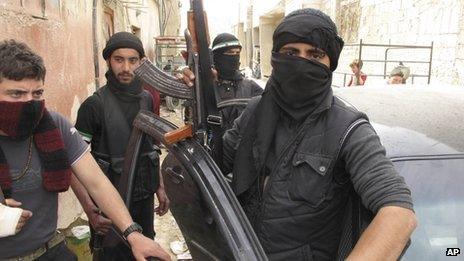Russian warns against arming Syrian opposition
- Published

Russian Foreign Minister Sergei Lavrov has said Syria's opposition will never defeat the country's armed forces even if it is "armed to the teeth".
Mr Lavrov warned that there would be "slaughter for many years" if Western and Arab states intervened militarily and supplied weapons to rebel groups.
Gulf states agreed on Sunday to pay the salaries of Free Syrian Army fighters.
Meanwhile, the US has warned the Syrian government not to intensify violence ahead of a ceasefire due on 10 April.
The US permanent representative to the UN, Susan Rice, said Syria's actions since 1 April did not encourage hope that it would comply with the six-point peace plan proposed by UN and Arab League envoy Kofi Annan.
Ms Rice said the US was "concerned and quite sceptical that the government of Syria will suddenly adhere to its commitments" and the UN would "need to respond to that failure in a very urgent and serious way".
The Syrian government has said it has agreed to the deadline, but activists accuse it of stalling for time so it can crush the uprising before UN monitors arrive and say attacks are continuing.
Mr Annan will brief the UN General Assembly on Thursday morning by video link from Geneva on the status of his peace plan for Syria.
On Tuesday, at least 58 civilians were killed, including 20 in military assaults and clashes between troops and rebels in Taftanaz, in the northern province of Idlib, the Syrian Observatory for Human Rights said.
Eighteen soldiers died in Homs, Idlib and Deraa provinces, it added.
Explosions and gunfire were reported in several parts of the country on Wednesday, including the city of Homs and near the Turkish border.
"Tanks are still shelling or storming towns and villages before going back to their bases," Rami Abdul Rahman of the Syrian Observatory told the AFP news agency. "That does not mean they are withdrawing."
'Mutual destruction'
During a visit to Azerbaijan on Wednesday, Russia's foreign minister said the "Friends of Syria" group of Western and Arab nations backing political change were hindering attempts to end the bloodshed.
"Everyone has supported Kofi Annan's plan, but decisions at the Friends of Syria group meeting aimed at arming the opposition and at new sanctions undermine peace efforts," Mr Lavrov told Russian media.
Mr Lavrov's comments come three days after Gulf Arab states agreed to pay the "salaries" of Free Syrian Army (FSA) fighters. The money will be distributed through the opposition Syrian National Council (SNC).
The money is the first formal international support for the FSA. Critics said the funds could be used to buy weapons on the black market.
"If the opposition is armed to the teeth, it will not defeat the Syrian army," Mr Lavrov warned on Wednesday. "Instead, there will be slaughter for many, many years - mutual destruction."
Saudi Arabia and Qatar have argued in favour of arming Syrian opposition supporters so they can defend themselves, but other countries supporting political change have opposed the idea, including the US.
The chairman of the SNC, Burhan Ghalioun, warned on Sunday that President Assad would use the divisions in the international community and Mr Annan's peace initiative to prolong the crackdown on dissent.
'Co-operation mechanism'
An advance team from the UN Department of Peacekeeping Operations (DPKO) is due in Syria imminently to discuss the deployment of the observers to monitor the implementation of Mr Annan's peace plan.
In addition to a ceasefire by all parties, it calls for a political process to address the "aspirations" of the Syrian people, the release of detainees, delivery of aid, free movement for journalists, and the right to protest.
On Wednesday Mr Annan held talks in Geneva with Norway's Maj-Gen Robert Mood, who will lead the advance team.
Gen Mood is a former head of the UN Truce Supervision Organisation (UNTSO), the UN peacekeeping operation in the Middle East.
Meanwhile, the head of the International Committee of the Red Cross (ICRC), Jakob Kellenberger, is continuing a visit to Syria.
On Tuesday, Mr Kellenberger tried to persuade senior Syrian officials to allow aid workers better access to those who have been wounded or displaced by the conflict, and to implement a two-hour daily halt to the fighting to allow in humanitarian aid.
Syrian Foreign Minister Walid Muallem agreed to a "co-operation mechanism" for humanitarian assistance when meeting Mr Kellenberger.